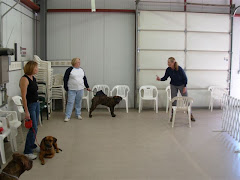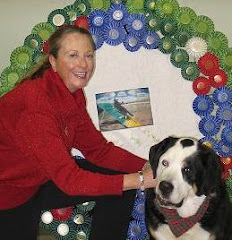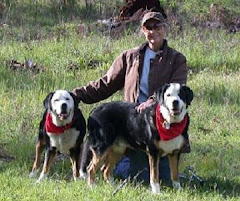
My husband finally lost his patience with Atlas last night.
The old dog had been stumbling around our little trailer, barking, grumbling, pacing, panting, and finally coming up to our tiny table where he nosed our wine glasses, tried to lick our dinner plates, and bumped my open laptop nearly onto the floor.
Don exploded with a loud, angry, "Atlas, NO!!! Stop it!" and gave him an uncharacteristically strong two-second jostle. He was immediate remorseful for having "lost it," and it really didn't do much good anyway, since Atlas (who's quite senile) is beyond understanding the "consequences for actions" theory of discipline.
Like a Mama Bear, I came to the defense of my child and got irritated with my husband. I did understand (I think) where the anger was coming from, at least in part. Don is still dealing with grief issues from the death of Atlas' littermate, Grasel, nine months ago. There's probably some resentment that Atlas just had a birthday and Grasel didn't. That, plus it had been a long and fatigueing day all-around, so tempers were already short.
We both agree that it's not yet time for Atlas to be put down. He's nowhere near ready to go. So we keep him around. But why?
My husband would probably say it's because we love him so much and owe him the best life we can give him.
I think it's more. And that's where the lesson is.
Our dogs are instruments given to us by God to help us become better individuals. "Better" means more loving, more compassionate, more accepting and more tolerant toward other soul-endowed individuals (i.e., people). Those last two are particularly hard lessons for many of us! Love and compassion come almost naturally to most people, but acceptance and tolerance must be PRACTICED (and that requires effort!) Our old dog is an instrument on which we can practice, so that we'll be better at dealing with PEOPLE in similar circumstances.
It's been said that a human "society" can be judged by how it treats its weakest members. In a feral setting, Atlas would already be dead by natural selection. But he lives like a person, in a human "society." It is a purely human idiosyncracy to try to save the weakest. Seems kind of silly, until you realize it's all part of a lesson in spiritual growth. Learn compassion, love, tolerance, and acceptance. Put other's needs before your own. Seize every opportunity to learn to become a better person. Always seek spiritual development from every situation life throws at you.
Some day we'll be able to use our "lessons from Atlas" to help other people. That's what it's all about.
The old dog had been stumbling around our little trailer, barking, grumbling, pacing, panting, and finally coming up to our tiny table where he nosed our wine glasses, tried to lick our dinner plates, and bumped my open laptop nearly onto the floor.
Don exploded with a loud, angry, "Atlas, NO!!! Stop it!" and gave him an uncharacteristically strong two-second jostle. He was immediate remorseful for having "lost it," and it really didn't do much good anyway, since Atlas (who's quite senile) is beyond understanding the "consequences for actions" theory of discipline.
Like a Mama Bear, I came to the defense of my child and got irritated with my husband. I did understand (I think) where the anger was coming from, at least in part. Don is still dealing with grief issues from the death of Atlas' littermate, Grasel, nine months ago. There's probably some resentment that Atlas just had a birthday and Grasel didn't. That, plus it had been a long and fatigueing day all-around, so tempers were already short.
We both agree that it's not yet time for Atlas to be put down. He's nowhere near ready to go. So we keep him around. But why?
My husband would probably say it's because we love him so much and owe him the best life we can give him.
I think it's more. And that's where the lesson is.
Our dogs are instruments given to us by God to help us become better individuals. "Better" means more loving, more compassionate, more accepting and more tolerant toward other soul-endowed individuals (i.e., people). Those last two are particularly hard lessons for many of us! Love and compassion come almost naturally to most people, but acceptance and tolerance must be PRACTICED (and that requires effort!) Our old dog is an instrument on which we can practice, so that we'll be better at dealing with PEOPLE in similar circumstances.
It's been said that a human "society" can be judged by how it treats its weakest members. In a feral setting, Atlas would already be dead by natural selection. But he lives like a person, in a human "society." It is a purely human idiosyncracy to try to save the weakest. Seems kind of silly, until you realize it's all part of a lesson in spiritual growth. Learn compassion, love, tolerance, and acceptance. Put other's needs before your own. Seize every opportunity to learn to become a better person. Always seek spiritual development from every situation life throws at you.
Some day we'll be able to use our "lessons from Atlas" to help other people. That's what it's all about.


















No comments:
Post a Comment